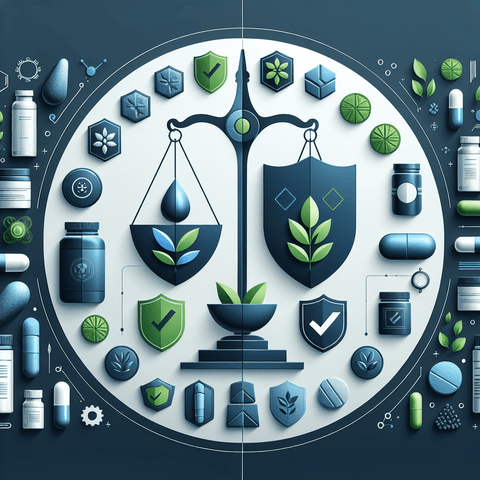Introduction
In today’s health-conscious world, dietary supplements have become an integral part of many individuals’ wellness routines. From supporting immune health to filling nutritional gaps, supplements offer a convenient way to enhance overall well-being. As the market for these products continues to grow exponentially, so does the variety and complexity surrounding their selection. Consumers are often overwhelmed by the sheer number of options, unclear labeling, and varying quality standards. This underscores the importance of understanding how to choose safe, reputable dietary supplements that align with your health goals and minimize risks.
This comprehensive guide aims to equip you with the essential knowledge and practical tips for selecting high-quality supplements. Whether you are new to dietary supplements or a seasoned user, learning to differentiate between trustworthy products and potential scams is crucial for safeguarding your health. We will delve into what dietary supplements are, how they support your health, and most importantly, how to verify their safety and efficacy. From identifying reputable brands to understanding labeling and regulatory standards, this guide provides a step-by-step approach to making informed decisions. Ultimately, prioritizing safety and quality ensures that your supplement choices genuinely benefit your health without exposing you to unnecessary risks.
Understanding Dietary Supplements in Nutritional Supplements
Definition and Types of Dietary Supplements
Dietary supplements are products designed to supplement the diet and provide nutrients that may be missing or insufficient in your regular eating habits. According to regulatory bodies, such as the U.S. Food and Drug Administration (FDA) and the European Food Safety Authority (EFSA), dietary supplements include vitamins, minerals, herbal products, amino acids, enzymes, and other botanicals. These products come in various forms to cater to individual preferences and needs, ranging from capsules and tablets to powders and liquids.
Common forms of dietary supplements include pills, capsules, powders, liquids, and gummies. Pills and tablets are traditional forms due to their ease of use and longer shelf life. Powders are popular for their versatility, allowing users to mix them with beverages. Liquid supplements are often preferred by people with difficulty swallowing pills or by children. Gummies provide a palatable option, especially for those sensitive to pills, although they may contain added sugars or artificial flavorings.
The Role of Dietary Supplements in Supporting Overall Health and Wellness
Dietary supplements serve various roles in promoting health, including filling nutritional gaps, supporting immune function, enhancing athletic performance, and managing specific health conditions. For instance, Vitamin C (reviewed here Vitamin C benefits) is renowned for its role in immune support, while Vitamin D (see Vitamin D sources and safety) is vital for bone health and immune regulation. Minerals like magnesium support muscle function and energy production (Magnesium benefits), and Omega-3 fatty acids, such as DHA and EPA, promote cognitive and cardiovascular health (Omega-3 supplements). Ultimately, supplements can provide targeted support and help maintain optimal health when used appropriately.
It is essential, however, to recognize that dietary supplements are intended to complement, not replace, a balanced and nutritious diet. They should be part of a holistic approach to health that includes proper nutrition, regular physical activity, adequate sleep, and stress management. Improper use or overreliance on supplements without proper guidance can lead to adverse effects, making it crucial to understand their correct application and limitations.
Common Forms: Pills, Powders, Liquids, and Gummies
Choosing the right form of supplement depends on personal preferences, lifestyle, and specific health needs. Pills and capsules are the most common and are generally convenient, portable, and have a long shelf life. Powders are versatile for mixing into drinks or smoothies, allowing flexibility in dosage. Liquids are quickly absorbed and suitable for people with swallowing issues or children. Gummies are favored for their taste and ease of consumption but may contain added sugars and artificial ingredients, which should be considered in their selection.
For example, if you are interested in supplementing with Vitamin C (which supports the immune response), you might opt for a powder form to add into your favorite beverage, or choose capsules if you prefer a straightforward option. When selecting any supplement, it's important to evaluate its form for ease of use, absorption rate, and compatibility with your health condition or preferences.
Regulatory Landscape and Why Quality Matters
Unlike pharmaceutical drugs, dietary supplements are regulated as food products in many countries, including the United States and the European Union. This means that supplement manufacturers are not required to obtain approval before marketing their products, but they must comply with manufacturing standards and label accuracy. Nonetheless, the regulatory environment can vary significantly, and some products may contain contaminants, incorrect ingredient dosages, or undisclosed substances.
Quality matters because supplements can pose health risks if contaminated or mislabeled. For example, heavy metals like lead, arsenic, or mercury can be found in poorly manufactured products, posing serious health risks. Similarly, adulteration with pharmaceutical ingredients or unapproved substances can lead to adverse health effects. Therefore, consumers should prioritize products that have undergone rigorous testing and certification to ensure safety, potency, and purity.
Understanding the regulatory framework helps consumers recognize the importance of purchasing from trustworthy sources that adhere to high manufacturing standards and transparency. Supporting brands that value quality assurance can greatly reduce potential health risks associated with dietary supplements.
Supplement Safety: How to Protect Your Health When Choosing Nutritional Supplements
Common Risks Associated with Poorly Regulated or Substandard Supplements
While dietary supplements can be beneficial, the risks associated with subpar products are real. Poor regulation can lead to contamination with heavy metals, bacteria, or unlisted ingredients. Some supplements may contain pharmaceuticals, steroids, or unapproved substances not declared on the label, which can cause serious health issues and drug interactions. Moreover, the presence of incorrect dosages, adulterants, or counterfeit products further exacerbates safety concerns.
Consumers who consume contaminated or adulterated supplements risk adverse reactions, including liver toxicity, allergic responses, or interactions with medications. In extreme cases, health complications from unsafe supplements can be severe, emphasizing the importance of choosing products from reputable sources.
Recognizing Signs of Unsafe or Contaminated Supplements
Signs of unsafe supplements include unusual taste, smell, or appearance, as well as reports of side effects like nausea, dizziness, or allergic reactions. Unusually rapid hair or muscle gains, unexplained weight changes, or other unexpected effects may also indicate contamination or adulteration. Furthermore, products that make exaggerated health claims or promise rapid, miraculous results should be approached with skepticism.
Always check for clear labeling, batch numbers, expiration dates, and manufacturer information. If a product lacks transparency, such as missing ingredient lists or unverifiable claims, it could be unsafe.
The Importance of Avoiding Overconsumption and Interactions
Many supplements contain potent ingredients that, when taken in excess, can cause toxicity or adverse interactions. For example, high doses of fat-soluble vitamins (like Vitamin A, D, E, and K) can accumulate in the body and lead to toxicity. Similarly, excessive mineral intake can disrupt electrolyte balance or cause toxicity. Certain supplements may also interact with prescription medications, reducing effectiveness or increasing side effects.
Consulting a healthcare professional before starting any new supplement is crucial, especially if you are pregnant, nursing, have existing health conditions, or take medications. They can advise you on appropriate doses and monitor for potential interactions.
Tips for Verifying Third-Party Testing and Safety Certifications
Third-party testing provides an objective assessment of supplement safety, potency, and purity. Recognized organizations such as NSF International, United States Pharmacopeia (USP), and Good Manufacturing Practices (GMP) certification ensure that products meet strict quality standards. Look for these seals on labels before purchasing. Additionally, reputable brands often publish detailed Certificates of Analysis (COA) substantiating their claims of ingredient levels and purity.
Always purchase from trusted vendors and avoid buying from unofficial sources or suspicious online marketplaces. When in doubt, research the brand’s reputation and history of quality assurance practices.
How to Read Supplement Labels for Safety Information
Reading labels carefully is vital. Verify the ingredient list, serving size, and dosage instructions. Beware of proprietary blends that do not disclose individual ingredient amounts. Check for certifications or safety seals and confirm the manufacturing date and expiration. If the label contains claims that seem too good to be true or unsubstantiated, approach with caution.
Ensure that the supplement complies with local regulations and contains all necessary warnings or contraindications. For example, products containing allergens such as gluten or soy should have clear declarations to prevent allergic reactions.
The Role of Healthcare Providers in Supplement Safety
Healthcare professionals, such as doctors, pharmacists, or registered dietitians, can provide personalized guidance tailored to your health profile. They can help identify potential interactions, recommend appropriate dosages, and suggest reputable brands. Regular health check-ups and blood tests can also monitor the impact of supplements and prevent adverse effects.
Always inform your healthcare provider about any supplements you take, particularly before undergoing medical procedures or starting new medications. Informed guidance helps maximize benefits while minimizing risks.
Reputable Supplement Brands: Ensuring You Purchase from Trusted Sources
Characteristics of Reputable Supplement Brands
Trustworthy brands prioritize quality, transparency, and consumer safety. They adhere to stringent manufacturing standards, conduct independent testing, and provide clear, accurate labeling. Reputable companies are transparent about their sourcing, production processes, and quality assurance measures. They often have certifications from recognized organizations such as NSF or USP, ensuring compliance with industry standards.
Moreover, these brands invest in research and development, keeping their formulations up-to-date with scientific evidence. They also maintain open communication channels and are responsive to consumer inquiries or concerns.
How Brand Reputation Impacts Product Quality and Safety
A brand with a strong reputation is more likely to produce safe, effective supplements. Consumer reviews, testimonials, and third-party evaluations can provide insights into product quality. Be wary of brands with multiple recalls, negative reviews regarding safety issues, or vague manufacturing information. Investigating the company’s history helps ensure you select products from reliable sources.
Researching Company Histories and Transparency Practices
Check whether the manufacturer provides detailed information about ingredient sourcing, manufacturing practices, and quality control processes. Companies committed to transparency often publish Certificates of Analysis (COA) results, and have clear contact information for customer support. Use online reviews and forums to gauge consumer experiences and industry reputation.
Trusted Avenues for Purchasing Supplements
The safest way to purchase dietary supplements is through official brand websites or reputable retailers with strict quality controls. These sources often have rigorous quality standards and provide genuine products. Avoid unverified online marketplaces or suspicious sellers that may sell counterfeit or contaminated products. Retailers such as Topvitamine purchase through verified channels, ensuring product integrity.
Red Flags Indicating Unreliable Brands
Untrustworthy brands often use vague or misleading labeling, make exaggerated health claims, or lack transparency about manufacturing practices. Warning signs include missing certifications, unknown or unverified ingredients, and products that come at suspiciously low prices. Always perform due diligence before making a purchase.
Quality Assurance in Supplements: Why It Matters and How to Confirm It
The Importance of Quality Assurance in Dietary Supplements
Quality assurance is the foundation of safe supplement use. It ensures the product contains what it claims, in the correct dosage, and free of harmful contaminants. High-quality products undergo rigorous testing throughout their manufacturing cycle, from raw materials to finished goods. This reduces risks and maximizes safety and efficacy for consumers.
Certifications to Look For (e.g., NSF, USP, GMP)
Recognition by certifying organizations adds credibility. The NSF Certification program assures that products meet strict standards for safety and quality. USP verifies that supplements contain the stated ingredients in the declared amounts and are free from contaminants. GMP (Good Manufacturing Practices) certification indicates adherence to manufacturing quality standards during production.
Look for these logos on product labels when shopping, and verify their authenticity by visiting the certifying organization's website.
The Role of Independent Testing Laboratories Verify Supplement Quality
Independent laboratories conduct tests to confirm ingredient authenticity, potency, and purity. Some brands collaborate with these labs and provide test reports for consumers to view. Purchasing products with COA (Certificate of Analysis) documentation adds an extra layer of confidence in their safety and quality.
Identifying Counterfeit or Mislabeled Products
Counterfeit supplements often mimic reputable brands but contain unknown or dangerous ingredients. Counterfeit products may have inconsistent labeling, poor packaging, or unverified sources. Always purchase from trusted suppliers and verify batch numbers and certifications to avoid counterfeit items.
Strategies to Ensure Your Supplements Meet High Quality Standards
Research brands thoroughly, focusing on their certification status and transparency. Check for third-party testing results, and prefer products from companies with a proven track record of quality. Regularly staying informed about recalls or safety alerts related to your supplement brands can help you avoid unsafe products.
Consumer Guide to Dietary Pills: Making Informed Choices
Steps for Evaluating Supplement Claims and Marketing
Scrutinize marketing claims critically. Avoid products promising rapid cures or exaggerated results. Look for evidence-backed benefits supported by scientific research. Regulatory standards prohibit false health claims, but some products may still include misleading statements. Always check whether claims are substantiated by credible studies or expert endorsements.
Understanding Ingredients and Their Proven Effects
Familiarize yourself with ingredients and their documented benefits. For example, Vitamin K (see Vitamin K benefits) plays a role in blood clotting, while Magnesium (see Magnesium benefits) supports energy, muscle, and bone health. Verify that your supplement’s ingredient list matches your health needs and research their efficacy.
The Significance of Dosage and Ingredient Transparency
Choose products where ingredient amounts are clearly disclosed, allowing you to assess whether they meet recommended safe levels. Proprietary blends that obscure individual ingredient dosages should be avoided. Transparency ensures you know what you are consuming and can prevent inadvertent overdose or interactions.
Recognizing Bogus Health Claims and Unsupported Benefits
If a supplement claims to cure, prevent, or treat specific health conditions without scientific consensus or regulatory approval, it’s likely unsubstantiated. Always consult credible sources and healthcare providers before relying on such products.
Consulting Healthcare Professionals Before Starting New Supplements
Professional advice ensures your supplement choices complement your health profile and existing medications. Healthcare providers can recommend appropriate products and monitor for side effects or interactions, especially for those with chronic conditions or those taking multiple medications.
Keeping Track of Supplement Efficacy and Side Effects
Maintain a journal to record any changes in symptoms, energy levels, or adverse reactions. Share this information with your healthcare provider to evaluate whether the supplement is beneficial and adjust your regimen accordingly.
Trusted Supplement Manufacturers: Partnering with Companies Committed to Safety and Quality
Key Qualities of Trusted Manufacturers
Reliable manufacturers demonstrate commitment through transparent sourcing, stringent quality control, and adherence to international standards. They conduct independent testing, provide comprehensive labeling, and maintain consistent quality across production batches. Supporting such companies ensures safer product choices and fosters industry accountability.
Examples of Leading Reputable Supplement Companies
While specific brands may vary depending on your region, companies that emphasize transparency, third-party verification, and quality control are generally trustworthy. Look for those that publish COA results and have certifications like NSF or GMP.
How These Manufacturers Maintain High Standards from Raw Materials to Finished Products
High-quality manufacturers source ingredients from verified suppliers, implement rigorous testing at each production stage, and employ strict manufacturing protocols. Continuous quality audits and consumer feedback mechanisms help sustain high standards and drive improvements.
Their Commitment to Consumer Safety and Continuous Quality Improvement
These companies prioritize safety by regularly updating their formulations based on scientific research and regulatory changes. They invest in staff training, process enhancements, and independent testing to uphold product integrity.
The Importance of Transparent Sourcing and Ingredient Listing
Transparency in ingredient sourcing and labeling allows consumers to make informed decisions and avoid allergens or contaminants. Seek out brands that clearly disclose their raw material origins and production processes.
How to Identify and Support Trustworthy Manufacturers
Research the company’s background, certifications, and customer reviews. Support brands that demonstrate accountability, transparency, and a commitment to quality. Your choice can influence industry standards and promote better manufacturing practices.
Conclusion
Choosing safe, reputable dietary supplements requires informed research, critical evaluation, and awareness of quality standards. Prioritize products that bear recognized certifications, come from trustworthy brands, and have transparent labeling. Always consult healthcare professionals before introducing new supplements into your routine, especially if you have existing health conditions or are on medications. Remember, supplements should complement a balanced diet and lifestyle, not replace foundational health habits. With due diligence and a cautious approach, you can harness the benefits of dietary supplements safely and effectively, supporting your journey towards optimal health.
Q&A Section
Q1: How can I tell if a supplement is safe to consume?
A1: Look for reputable brands with certifications like NSF, USP, or GMP. Check for transparent labeling, including ingredient lists, batch numbers, and expiration dates. Avoid products making exaggerated claims or lacking third-party testing. When in doubt, consult a healthcare professional.
Q2: Are all supplements created equal, or should I stick to well-known brands?
A2: Not all supplements are equal. Well-established brands with transparent practices, third-party verification, and positive reviews are generally more trustworthy. Research brands thoroughly before purchasing.
Q3: Can I take multiple supplements at once?
A3: While some supplement combinations are safe, others can interact negatively or cause overdose. Always consult a healthcare provider to discuss your routine and avoid potential interactions.
Q4: What should I avoid when purchasing supplements online?
A4: Avoid suspicious sites offering low prices, unfamiliar or unverified brands, lack of certifications, or vague ingredient lists. Purchase only from verified, reputable sources.
Q5: How do I know if a supplement actually works?
A5: Look for products with proven ingredients and transparent dosages. Track your progress and any side effects, and consult a healthcare professional for personalized advice. Remember, supplements should complement a healthy lifestyle, not replace it.
Important Keywords
- Dietary supplements
- Supplement safety
- Reputable supplement brands
- Quality assurance
- Supplement labeling
- Third-party testing
- Certifications (GMP, NSF, USP)
- Safe supplement sourcing
- Supplements for immunity, bone health, energy
- Informed supplement choice



